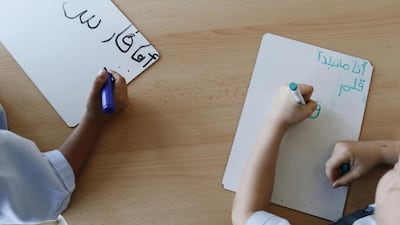More than half the world is bilingual. That makes monolinguals like me a rapidly shrinking minority. I imagined that moving to the UAE might help me master Arabic, or at least give my children a fighting chance, but no. Even after six years of schooling many western expatriate kids can barely parrot a list of colours in Arabic, let alone conjugate Arabic’s 15 verbal forms. This is a massive missed opportunity. Many expatriates, when they leave the UAE, won’t even know how to say goodbye in Arabic. What’s up with that?
First, Arabic is not an easy language for English speakers to master. The Defense Language Institute, a research body associated with the United States Department of Defense, categorises Arabic as a level IV language, meaning it is one of the most difficult for native English speakers to learn. Other level IV languages include Chinese, Japanese and Korean.
But surely difficulty isn’t the whole story? People who’ve spent significant time in Japan or Korea generally leave accomplished enough, linguistically speaking, to impress me at a restaurant, at the very least. The issue with Arabic and the UAE expatriate experience, is the lack of high quality of teachers and an even greater lack of motivation.
Friedrich Nietzsche said it best: “He who has a WHY can deal with almost any HOW.” Many expatriates in the UAE don’t have a “why”; we don’t see a reason to learn Arabic. For most of our day-to-day interactions, Arabic is totally unnecessary, and in my experience, Arabic can even be a handicap. I practise my rudimentary Arabic by ordering drinks at random coffee shops – ‘‘gahwa bill haleeb min fadlik’’ (coffee with milk please)? – which is often met with incredulity and the barista reaching for a pictorial menu to help me overcome my linguistic impediment.
So why even bother trying to learn Arabic? I’m sure this is a question many expat schoolchildren grapple with. But to them I say this: Arabic is unequivocally one of mankind’s greatest languages, spoken by more than a quarter of a billion people. It is also one of the six official languages of the United Nations, and is classified among the world’s civilisational tongues, alongside Latin and Classical Greek. It also has some pretty cool psycholinguistic features. For example, Arabic is one of only a handful of the world’s languages that freely permits both subject-verb-object (SVO), and verb-subject-object (VSO) sentences. So, in Arabic you can say: Justin wrote the article (SVO). You could also say: Wrote Justin the article (VSO). “Big deal,” I can hear you think, but it is this type of linguistic rarity that keeps psycholinguists awake at night pondering the origins of language and the relationship between language and thought. If nothing else, this flexibility makes Arabic a great language for poetry.
On a more general note, just being bilingual confers a host of positive cognitive benefits. There are arguments that bilinguals have better attention and task-switching abilities. Additionally, recent research has shown that bilinguals are less prone to certain common decision-making biases, while using their second language.
If we can be bothered to look, there are lots of reasons to learn Arabic. In the UAE, Arabic is mandatory in most schools. Unfortunately, in my experience, the tuition of non-native speakers has been dire. Being able to speak Arabic is not a licence to teach Arabic. Speaking and teaching are very different skill sets. And given that Arabic is a level IV language, it takes a particularly patient and skilled teacher to work with those wishing to learn.
I frequently hear horror stories about the Arabic classes in UAE schools. There are teachers who confuse volume with pedagogy. Some simply dictate Arabic poetry without ever explaining the meaning of a single word. Some schools place all the non-native students in the same section, regardless of individual levels of knowledge, working to the theory that “it’s only Arabic” and no one will mind.
If we are going to make Arabic mandatory, then we need more well-trained Arabic language specialists and school administrators that support the teaching of Arabic. If not, we end up with a classroom where one third of the children don’t want to learn, another third are still trying to get to grips with the 28-letter alphabet, and the motivated third slowly lose their love of the language as the teacher introduces them to Arabic colours for the sixth time in as many years.
Justin Thomas is an associate professor of psychology at Zayed University and author of Psychological Well-Being in the Gulf States
On Twitter: @DrJustinThomas


